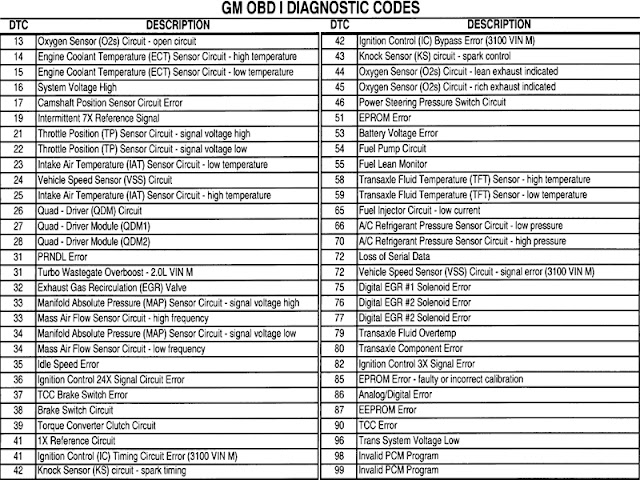GM Trouble Code P0102: Your Car's Cryptic Whisperer
Your check engine light is on. Great. Just great. Another cryptic message from the automotive gods. You plug in your OBD-II scanner, and bam: P0102. Now what? This isn't some secret society handshake; it's the dreaded GM trouble code P0102, and it’s time to decode this digital riddle.
The P0102 diagnostic trouble code (DTC) specifically points to a problem with your Mass Air Flow (MAF) sensor. This little component, nestled somewhere in your engine's intake system, measures the amount of air entering the engine. The engine control module (ECM) uses this information to calculate the correct fuel mixture. A P0102 code essentially screams, "Hey! My MAF sensor is sending low voltage signals! Something's wrong!"
But why should you care? Well, a faulty MAF sensor can lead to all sorts of driving headaches, from rough idling and poor fuel economy to stalling and even decreased engine power. Ignoring it won't make it magically disappear; it'll likely just worsen the underlying issue and potentially damage other components. So, let's dive into the murky depths of the P0102 code and emerge with the knowledge to conquer this automotive enigma.
This code isn't unique to a specific GM model; it's a universal trouble code, meaning it applies across various makes and models, but it's particularly prevalent in GM vehicles. While the code itself is standard, the specific causes and solutions might vary slightly depending on the specific engine and model year. So, while this information provides a general overview, always consult your vehicle's repair manual for detailed instructions.
The introduction of OBD-II diagnostics in the mid-1990s standardized these trouble codes, making diagnosing car problems much easier. Before that, it was a guessing game, relying heavily on experience and intuition. The P0102 code, like others, provides a crucial starting point for troubleshooting. Now, let's explore the potential culprits behind this frustrating code.
One common cause is a dirty or faulty MAF sensor. Over time, dirt, debris, and oil can accumulate on the sensor, disrupting its ability to accurately measure airflow. Another possibility is a vacuum leak in the intake system, throwing off the air pressure readings. Damaged wiring or a loose connection to the MAF sensor can also trigger the P0102 code. Less frequently, a failing ECM can be the root of the problem, though this is usually a last resort diagnosis.
Cleaning the MAF sensor with a specialized cleaner is often the first and easiest step. If that doesn't resolve the issue, inspecting and repairing vacuum leaks, checking wiring connections, and testing the MAF sensor itself are the next steps. Replacing the MAF sensor is often the ultimate solution, but it's important to diagnose the problem correctly before throwing parts at it.
Advantages and Disadvantages of Understanding P0102
Knowing about P0102 allows for quicker diagnosis and repair, potentially saving money and preventing further damage.
Frequently Asked Questions about P0102:
1. What is P0102? Answer: A diagnostic trouble code related to the Mass Air Flow sensor.
2. What causes P0102? Answer: Various factors like a dirty MAF sensor, vacuum leaks, or wiring issues.
3. How do I fix P0102? Answer: By cleaning the MAF sensor, fixing vacuum leaks, or replacing the sensor.
4. Can I drive with a P0102 code? Answer: It's best to address it promptly to prevent further issues.
5. How much does it cost to fix P0102? Answer: It can range from the cost of a MAF cleaner to a new sensor.
6. How do I prevent P0102? Answer: Regular maintenance and keeping the air intake system clean can help.
7. Is P0102 serious? Answer: While not immediately catastrophic, it can lead to drivability problems and potential damage.
8. Can I diagnose P0102 myself? Answer: Yes, with an OBD-II scanner and some basic car knowledge.
Tips and Tricks: Use a high-quality MAF sensor cleaner. Consult your vehicle's repair manual for specific instructions.
Understanding the GM trouble code P0102 empowers car owners to take control of their vehicle’s health. By recognizing the symptoms, understanding the potential causes, and taking appropriate action, you can avoid costly repairs and keep your GM vehicle running smoothly. Addressing this issue quickly not only saves you money but also prevents further damage to your engine. Don't let a cryptic code intimidate you. Take the time to understand what your car is trying to tell you, and you’ll be back on the road in no time. Equipped with this knowledge, you're no longer at the mercy of a blinking check engine light. You’re a code-breaking, problem-solving automotive hero. Now go forth and conquer that P0102!
Sunset funeral home latest obits
The thrill of the track your guide to the paris 2024 athletics schedule
Unlocking the charm of sherwin williams colonial yellow














